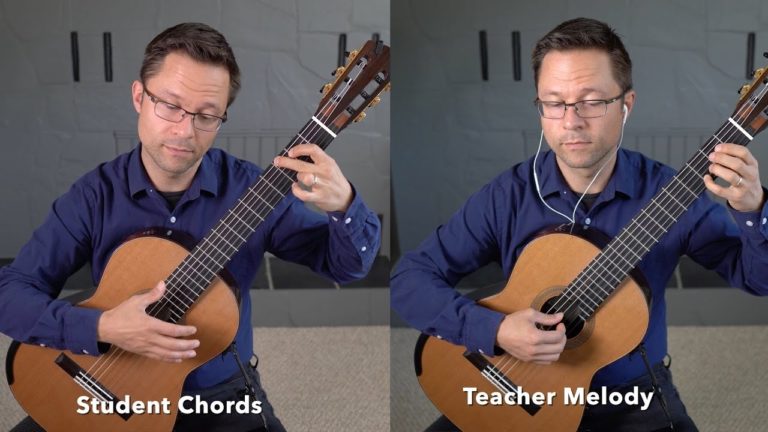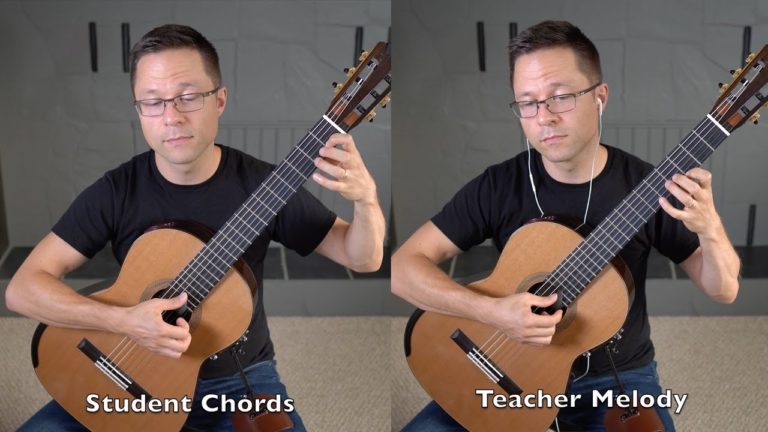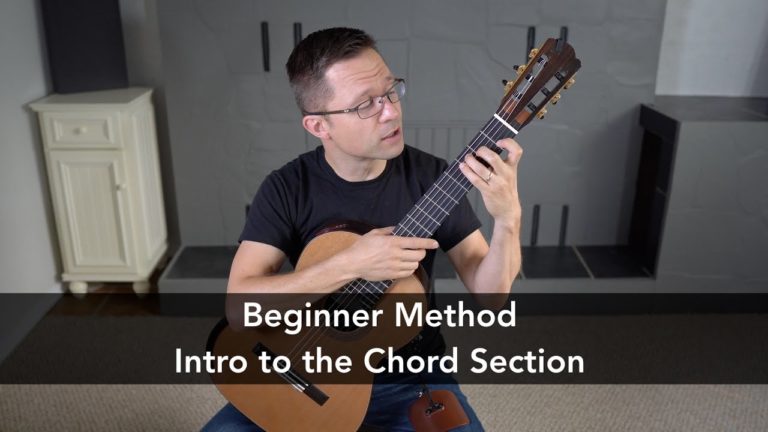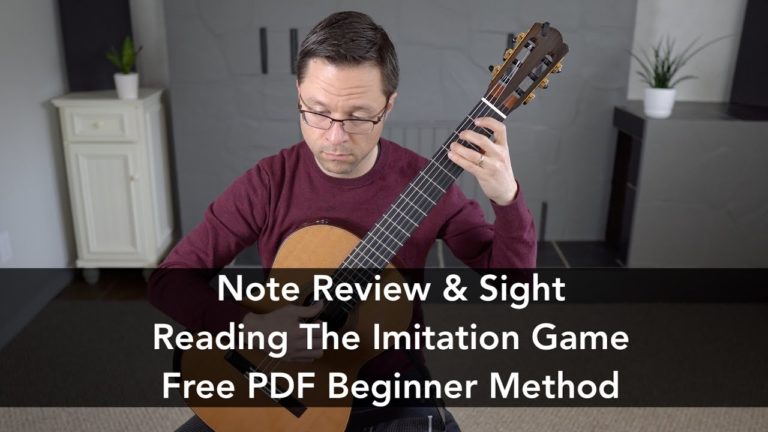Free Method Book – Beginner Video Lessons for Guitar
Etude No. 10 – The Swan
Etude No. 11 – The Old Douglas Fir
Dotted Quarter Note Lesson
Во поле березка стояла (Little Birch Tree in the Field) – Russian Folk Song
Free PDF Method Book & Lesson List: Classical Guitar Method Vol. 1
Youtube Video Link (4k Quality)
Some more beginner pieces for classical guitar from my method. Thanks to Natasha for suggesting the Russian song! This is the first two-voice pieces in the book. Make sure you’ve covered the previous lessons first. Find the rest of the video lessons here and subscribe to my weekly newsletter for pro videos, lessons, and sheet music.





Little difficulty spike here, this is giving me the most trouble so far. These pieces are taking the longest to learn. I’m still motivated making progress chipping away at them daily. One thing I noticed is my wrist bending and hand moving up and down when using my thumb at the same time as the i m or a finger
Keep in mind that the Volume 1 method can take anywhere from 6 months to 2 years! So take your time and enjoy. Practice that right hand with open strings only while keeping the hand still. Also, make sure to re-check your guitar position and hand positions as you will need to refine them on and off.
Hello Bradford,
I am having a hard time with volume control when playing two voices at once, for example in little birch tree the bass overshadows the melody. I also have the opposite problem with the leyendas theme, where I feel the bass melody is too weak. Are there excercises for this?
I wouldn’t worry about this too too much at this level. That said, a deeper follow through of the finger toward the palm for the finger you want louder can help. It’s sometime better than thinking in terms of pressure on the string which can transfer to the other fingers as well. Check out this lesson on the topic.
Hi Bradford,
Spotted what may be a typo on page 54 of your method book 1.
Voice Two (lower) has an E in bar 3 when written alone, but when combined with the upper voice it’s an A.
Thanks so much, I’ll correct that immediately. Good eye.ear!
I’m not hearing you mute the A in measure 4 to achieve the rest in the lower voice. Should I not worry about that?
Not at this level. I introduce the first muting techniques in my Grade 3 book. So relax for now!
Does the recommendation of not muting also apply to all of the lower voice in Etude No. 11? It doesn’t appear that you do and it is challenging to do so.
No, you don’t have to specifically mute for 11. But you can certainly try it out to on a section to up your skills and hear what the result is.
Thank you!
Hi. I have some trouble when it comes the part where I have to play two strings at the same time. Sometimes the i or m finger touch the string above. This usually happens when the distance is larger, for example when I have to play both B and E (the little birch tree). Also I noticed that the finger’s synchronization of the right hand isn’t that good. Any advice?
thanks!
Have you worked on the open string exercises at the end of the book in the technique warmup. Usually these things are best address on their own. Also make sure to review and review again and again all the positioning posts for guitar position, right and left hand position lessons on the lesson page: https://www.thisisclassicalguitar.com/lessons/
Hi Bradford, I have a question related to right hand technique. Up this point in your book I’ve been anchoring my thumb on one of the bass strings, but now that we’re playing the bass notes I’m unsure where to place my thumb/fingers that aren’t plucking notes. Should we be anchoring at all, or is it better to have to keep the fingers floating above the strings? Thanks!
For beginners I recommend resting the thumb when playing single line music that only uses i, m, a. When playing two voice works or arpeggios just float the hand, all the support and security comes from the contact point on the right forearm. Later on you can experiment more but for now this will teach you both ideas.
Great lessons and books, thank you. I’m currently stuck on the little birch tree (I’ve moved on, but I keep coming back to this one – there’s something about it that I’m finding hard).
Anyway, would you be able to let us know what beat count you and your student are playing at? I set that as my eventual goal for each piece, and with effort I can get my metronome to match it. (I suppose I’m just being lazy here, but I’m guessing that other people might also find this information helpful).
Don’t worry about reaching a certain speed. Focus on foundation building: steady beat, correct rhythms, phrasing, legato.
Wow. I don’t know how long it should take to be able to play the etude 10, but it’s taking me days. If the trebles aren’t squeaking, I’m hitting the wrong bass strings.
It can take weeks to months to play a tricky piece well so I suggest you continue with new material but keep studying this piece almost starting over with a much slower tempo until your hands understand what to do. Remember, the more you play correctly the more your hands will remember how to play correctly. This usually requires a slow slow slow tempo. If it frustrates you just keep it to 5 mins a day.
Thanks for replying. BTW, I have to use Firefox to send a message as there is an issue with Chrome/Brave. As regards the practice, I’m flitting between arpeggios, scales and this stuff, so I just do a few minutes of each every day. I’ve done bits of just about every method in existence, so I should be playing concerts by now 🙂 We’ll see…
Do you have any advice for playing legato when you are going from an open string to a fretted note (e.g., open B string then to a C, in first position). I find that the second note cuts off the first note too abruptly. If I try to apply my finger to the fret “gently” I get an unpleasant buzzing sound as the note is choked off. I’m guessing a hammer-on is not appropriate. Is it just a matter of practice, or is there a specific way to approach this?
It could be an synchronization issue between the two hands (either hand could be hitting the string too early). However, sometimes beginners end up hearing something and then it’s all they can hear. I would just work past it and see if the issue doesn’t just clear up on it’s own with more playing. Often, there are ‘other fish to fry’ so to speak…